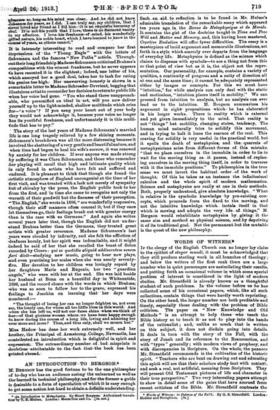AN INTRODUCTION . TO BERGSON:* M. Beffason has the good fortune
to be the -one phileeopher of to-day who has an audience ambng- the unlearned us %Prelims the. le arned-in technical ithilbeephy; -and for the -former a guide is desirabkt: to a form of speculation of 'which it is easy enough to get some notion: but hard to obtain a definite understanding.
• 4n Introduction ti Mettiphysics.-. B Henri- Borgnont- Authorised transla- ticarby-T; B.Ifulnie. London: MacmllIn and Co. [2s. net.] Such.. az . aid.. to reflection is to be found in Mr. Hnlme's admirable translation of the remarkable essay which appeared ten years ago in the Revue de Melaphysigue et de Morale. It contains the gist a the doctrine taught. in Time and Free Will and Matter and Memory, and, this having, been mastered, Creative Evolution will offer fewer difficulties. The essay is a masterpiece of lucid argument and memorable illustrations, set forth in a style which scarcely ever departs from the language of everyday life. Metaphysics is defined as the solemn) which claims to dispense with symbols—to see a thing not from this or that point of view but as it is, the object not the repre- sentation. Our.personality, for example, contains a variety of qualities, a continuity of progress and a unity of direction all at one and the same time ; it cannot be;adequately represented either by images or concepts. For this we must have "intuition," for while analysis can only deal with the static and motionless, "intuition places itself in mobility." We can proceed from intuition to analysis, but no analysis can ever lead us to the intuition. M. Bergson summarizes his argument in eighty- propositions which- he has elaborated in his larger works. There is reality which is external and yet given immediately to the mind. That: reality is not " things " but mobility, changing states, tendency. The human mind naturally tries to solidify this movement, and in trying to halt it loses the essence of the real. This craving for solidity is very useful in the practical world, but it spells the death of metaphysics, and the: quarrels of metaphysicians arise from different-forms of this mistake, "that we place ourselves in the immobile, in order to lie in wait for the moving thing as it pastes, instead of .replac- ing ourselves in the moving thing itself, in order to traverse with it the immobile positions." To philosophize in the-true sense we must invert the habitual order - of the work of thought. Of this he takes as an instance the infinitesimal calculus and the whole spirit of modern mathematics. Science and metaphysics are really at one in their methods. Both, properly understood, give absolute knowledge. "What is relative is the symbolic knowledge s by pre-existing con- cepts, which proceeds from the fixed to the moving, and not the intuitive knowledge which. instals itself • in that which is moving and adopts the very life of. things." M Bergson would rehabilitate metaphysics by. giving it the same aim and method as physical science, and, by depriving it of its traditional goal. Not the permanent but the mutable is the quest of the new philosophy.


























































 Previous page
Previous page